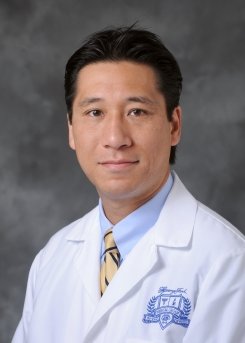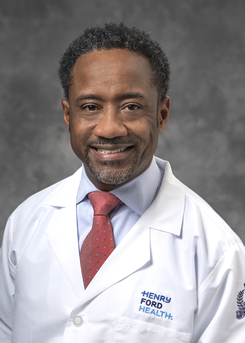Cancer Epidemiology, Prevention and Control Research
Mission
The CEPC is comprised of Ph.D. and M.D. researcher from the Departments of Public Health Sciences, Medical Oncology, Radiation Oncology, Surgical Oncology, Supportive Oncology, and the Center for Health Policy and Health Services Research, and its mission is to promote interdisciplinary cancer research by translating research discoveries into novel clinical advances to improve the standard of care in the prevention, diagnosis, and treatment of cancer and to maximize quality of life in cancer survivors.
Leadership

Christine Neslund-Dudas, PhD
Associate Scientist, Cancer Epidemiology
Co-Leader, Cancer Epidemiology, Prevention and Control Program
cdudas1@hfhs.org

Steven Chang, MD
Otolaryngologist
Co-Leader, Cancer Epidemiology, Prevention and Control Program
schang1@hfhs.org

Samantha Tam, MD
Otolaryngologist
Associate Leader, Implementation Science and Health Services Research
stam2@hfhs.org
Administration
Faculty




















Clinical Faculty











Doctoral Students
Global Health


Major Research Initiatives
-

Drs. Benjamin Rybicki and Christine Neslund-Dudas are leading the effort to recruit a prospective cohort of more than 16,000 patients at HFHS which will be part of a national cohort of 200,000 cancer-free adults, 30-70 years of age.
The NCI-funded national cohort will be recruited from multiple Integrated Health Care Systems across the US. The goal of this study is to conduct broad-based, high quality and impactful research to determine novel complex causes of cancer and translate this knowledge into more effective means of cancer prevention and control. Using medical histories, environment, biospecimens, and personal and vital record follow-up, a complete understanding of the natural history of cancer will be obtained so that precision prevention approaches, based on the environmental and genetic profiles of an individual, can be developed. An application process is available to any researcher wishing to use the resources and data generated from the cohort. -

Henry Ford Health, led by site-PI Christine Neslund-Dudas PhD, is one of 10 health systems that make up three distinct research centers within the NCI funded PROSPR network.
The goal of PROSPR is to better understand and improve the cancer screening process in community healthcare settings in the United States. PROSPR is conducting multi-level observational research to evaluate the quality and outcomes of screening processes for cervical, colorectal, and lung cancer. Each PROSPR Research Center (PRC) conducts organ-specific research and participates in trans-PROSPR research projects. Henry Ford Health is part of the PROSPR-Lung team known as LOTUS. -

Lung Cancer Screening Optimization in the U.S (LOTUS) is a project of the NCI PROSPR Network. This network includes multiple health care systems conducting research to better understand how to improve the cancer screening process in community healthcare settings.
Healthy Lung Study
Comparing Smoking Cessation Interventions Among Underserved Patients Referred for Lung Cancer Screening
Regular: The goal of this clinical trial is to test the effectiveness of four different interventions in helping underserved patients quit smoking. This study will also evaluate if different interventions work better for specific groups, for example for people of different races, ethnicities, incomes, and degrees of tobacco dependence. This trial will include 3,200 current smokers from underserved groups who are referred for lung cancer screening at one of four health systems: (1) University of Pennsylvania Health System, (2) Geisinger Health System, (3) Kaiser Permanente South California, and (4) Henry Ford Health. We will follow all patients for up to 18 months measuring if they have stopped using tobacco for 6 months straight and whether the interventions change any of a number of patient-reported factors that advisors indicated were important to measure, such as quality of life, urge to smoke, motivation to quit, and anxiety. These stakeholder advisors, including patients, doctors, community leaders, and other partners, helped design this trial in many other ways, and will continue to be involved throughout this study. Partners will draw from their experiences and networks to drive the study's success. At the end of this trial, health systems will be able to make better choices about which interventions to include in their lung cancer screening programs to help underserved, high-risk patients quit smokingWhich heading? Building A Knowledge-Bank For Analyzing Glioma Outcomes
Henry Ford Health’s Hermelin Brain Tumor Center (HBTC) is home to a clinically annotated brain tumor bank, from which 240 glioma cases have already been molecularly and clinically profiled by The Cancer Genome Atlas (TCGA). Dr. Laila Poisson’s current work (NCI R01CA222146) seeks to expand the molecular and clinical profiling to 550 glioma cases (WHO grade II-IV), with a focus on therapeutic outcomes, recurrent disease, and extended survival, which were not captured in the TCGA project. She has constructed an interdisciplinary team of collaborators with clinical and informatics expertise. Molecular data will be generated by exome sequencing and DNA methylation array. Together this will provide somatic alterations, copy number variants, and the methylome for the included specimens. Clinical annotation from the tumor bank, including long-term follow-up and therapy regimens, is being added to each of the profiled glioma cases.
The resulting comprehensively annotated tumor bank will be an invaluable resource for queries of clinical-molecular associations and the progression of disease, made available to researchers at Henry Ford Health and beyond. Dr. Poisson is particularly interested in addressing two analytical aims: (1) to design statistical models of prognosis and therapy response among modern diagnosis classes using retrospective records; and (2) to identify genomic differences, per patient, arising over the course of treatment and progression, which are expected to impact therapy decisions and inform standard treatments strategies. With her team, she will also explore the genomic patterns and clinical response of patients with exceptional survival, which may indicate differential molecular diagnosis or suggest therapeutic avenues for extending survival in others.
-

The All of Us Research Program (AoURP) is a cutting-edge collaboration with the National Institutes of Health (NIH), to advance precision medicine. Precision medicine is health care that is based on the individual.
It takes into account factors like where someone lives, their activities, and family health history. Precision medicine’s goal is to be able to tell people the best ways to stay healthy. If someone does get sick, precision medicine may help health care teams find the treatment that will work best. The promise of Precision Medicine in the U.S. can be most effectively realized on a large scale in the next decades if a research infrastructure is established and accessible to scientists across the nation and includes a large and engaged study population with comprehensive health and lifestyle histories linked to biospecimen.
To get there we are creating a research community of one million people who will share their unique health data. This will include answering survey questions and many timepoints and sharing electronic health records. Some participants may also be asked to provide blood or urine samples. Critically, this population must be diverse, representing minority and other subgroups underrepresented in biomedical research. The health data we gather from participants will be stored in a database. Approved researchers can access this data to explore how factors like environment, lifestyle, and genes, can impact health. This may help develop new medical treatments that are unique to individuals and enable a future of precision medicine for all of us.
Locally, AoURP is a joint venture with Henry Ford Health’s Center for Health Policy and Health Services Research and our consortium partners at 5 other health systems across the country.
Get Involved
Join our Research Team
We welcome, and at times actively recruit, researchers to Henry Ford Health to contribute to our Cancer Epidemiology, Prevention and Control research work.
Donate to Cancer Research
The Cancer Epidemiology, Prevention and Control Program relies on grant and philanthropic funding and so appreciates and carefully uses such gifts.
Become a Patient Advisor
Patient-Centered Outcomes Research is a new approach to research that empowers patients and their families to ask questions, be involved and actively participate in studies that improve quality of life for current and future patients. Henry Ford Health currently has over 400 patient advisors and is actively recruiting more.
.svg?iar=0&hash=F6049510E33E4E6D8196C26CCC0A64A4)

/hfh-logo-main--white.svg?iar=0&hash=ED491CBFADFB7670FAE94559C98D7798)